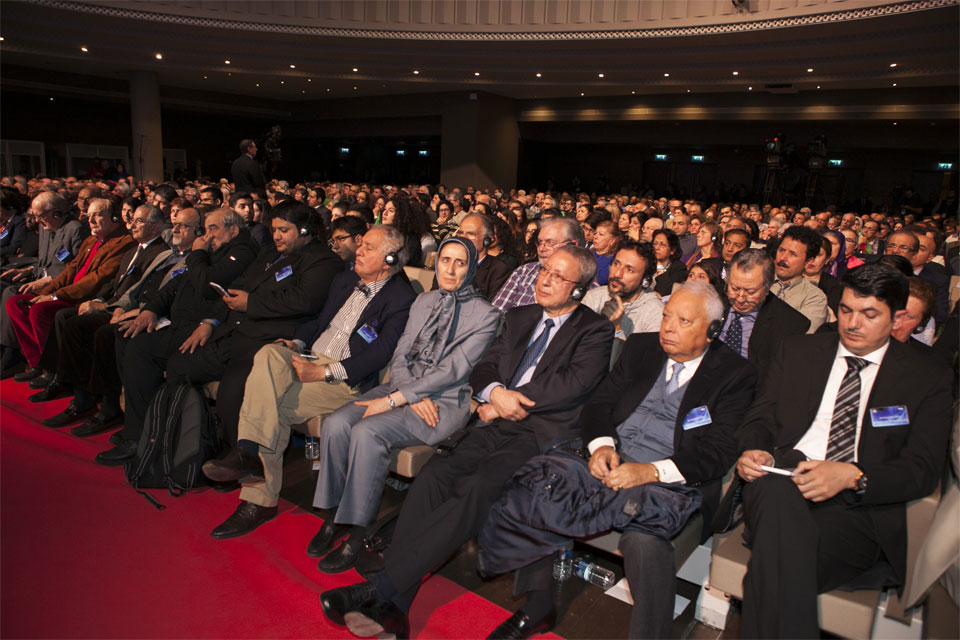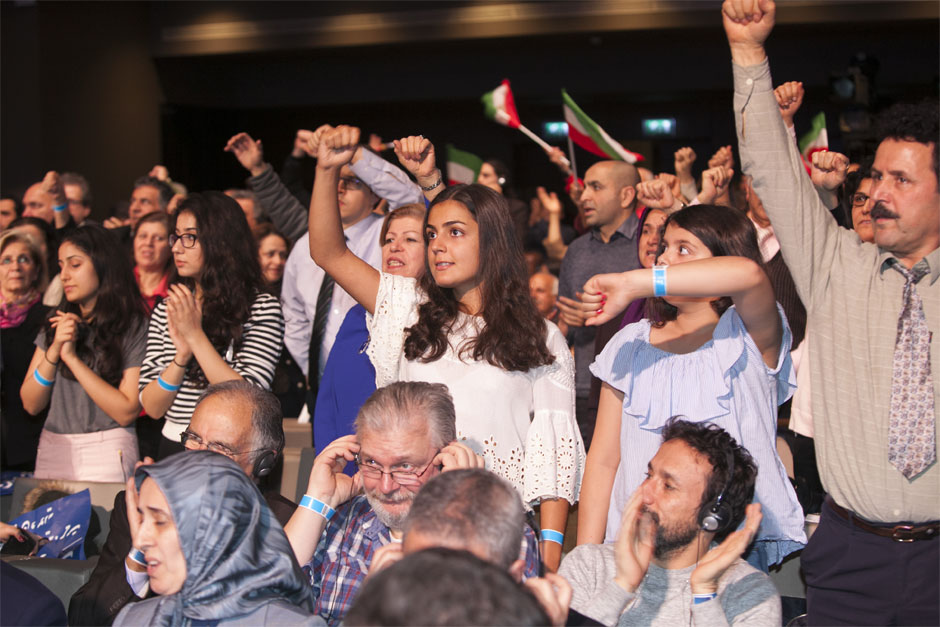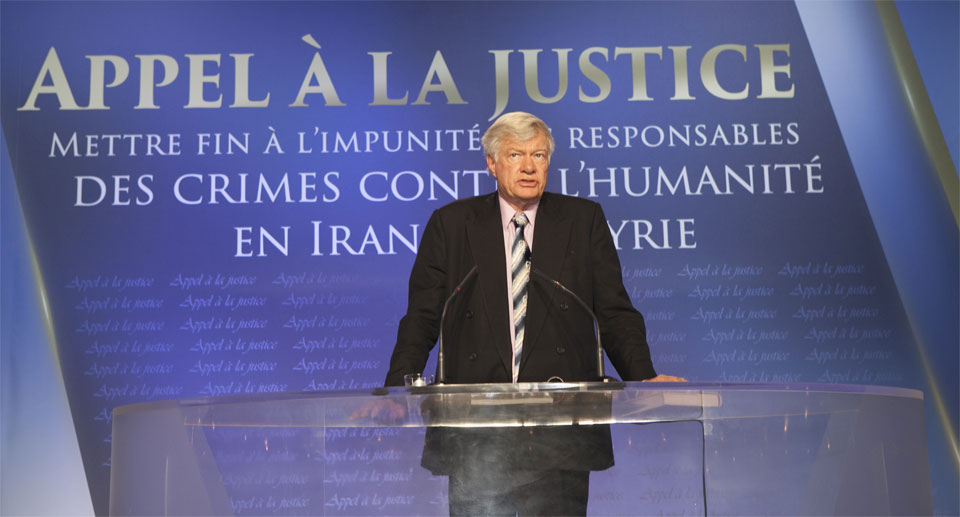Geoffrey Robertson, QC, a former UN tribunal chief judge on Sierra Leone and prominent human rights barrister from UK, has told a conference in Paris that based on his own impartial investigation, the 1988 massacre in Iran amounted to a “crime against humanity”.
The conference, held on 26 November 2016 in Paris’ Mutualité conference centre, was titled, “Call for Justice: Ending Impunity for Perpetrators of Crimes Against Humanity in Iran and Syria”.
The following is the text of Mr. Robertson’s remarks:
Good afternoon, I’m ashamed to say that in 2009, just seven years ago, I knew absolutely nothing about the 1988 prison massacres, and I had written a book Crimes Against Humanity. The textbook in English is into its fourth edition. I had been a United Nations judge, president of a war crimes court in Sierra Leone, I was a judge in England, and I didn’t know, like almost all international lawyers outside Iran about this most wicked crime. And I’m going to tell you exactly how wicked it is. I knew nothing until I was approached by two remarkable women. The Boroumand sisters. They had a little foundation, and they said “We’re looking for an impartial judge to investigate and decide whether what happened in 1988 was a crime against humanity” and I warned them, I said, “Look, I’m a Queen’s council, I’m independent, I could find, look at the evidence, I could very well find that prisons in Iran in 1988 were perfect. I could find that they were run with great humanity and justice.” “All right” they said, “we’ll take the risk.” And so, for the next nine months I went throughout Europe, digging out survivors of that appalling time and that appalling crime. And I interviewed them, interrogated them, I read all there was to read for the United Nations records, the press at the time, Amnesty International had a little to say about it. And I then wrote a report and I read you because we don’t have a great deal of time, the summary of my report. It was this, because I found out what happened:

“Late in July 1988, as the war with Iraq was ending in a truculent truce, prisons in Iran crammed with government opponents suddenly went into lockdown. All family visits were cancelled, televisions and radios switched off and newspapers discontinued. Prisoners kept in their cells, disallowed exercise or trips to the infirmary. The only permitted visitation was from a delegation, turbaned and bearded, which came in government BMWs and Mercedes to outline jails: a religious judge, a public prosecutor, and an intelligence chief. Before them were paraded, briefly and individually, almost every prisoner (and there were thousands of them) who had been jailed for adherence to the MEK (People’s Mojahedin or PMOI). The delegation had but one question for these young men and women (most of them detained since 1981 merely for taking part in street protests or possession of ‘political’ reading material), and although they did not know it, on the answer their life would depend. Those who by their answer evinced any continuing affiliation with the MEK were blindfolded and ordered to join a conga-line that led straight to the gallows. They were hung from cranes, four at a time, or in groups of six from ropes hanging from the stage in an assembly hall; some were taken to army barracks at night, directed to make their wills and then shot by firing squad. Their bodies were doused with disinfectant, placed packed in refrigerated trucks and buried by night in mass graves. Months later their families, desperate for information about their children or their partners, would be handed a plastic bag with their few possessions. They would be refused any information about the location of the graves and ordered never to mourn them in public. By mid-August 1988, thousands of prisoners had been killed in this manner by the state – without trial, without appeal and utterly without mercy.”
That was my judicial conclusion about what happened based on evidence and interviews. And of course it went on, the regime having killed the MEK members, then went on and killed thousands whose religious views or non-religious views were not satisfactory to the routine. The death committee went to prisons again and they had thousands of victims. Ominous and atheists and those who were attracted to minority religions or not at all. Families still are not allowed to know where the bodies of their loved ones are. This is a monstrosity. Some of you remember Sophocles’ Antigone, the play written 2500 years ago about the barbarity of not allowing a family to bury a body. It’s now contrary to international law as I’ll explain, and still the Mullahs Without Mercy, which was the title of a book that I wrote about this appalling event.
My conclusion as an international judge is that this without any reasonable doubt, is a crime against humanity. It has been a crime to kill prisoners for over 400 years, the rules of army, the rules during the wars in Europe were always that a prisoner once surrendered could not be killed without trial and could not be tortured. So, where does this massive crime of 1988 stand? Of course, there is nothing that can exceed the Nazis brutality of the concentration camps, but the world insofar as we have come to any form of international law has made through the Geneva Conventions, made it a crime, the worst crime of all, to slaughter prisoners, people who are in the most vulnerable situation. They must not be tortured, they must not be executed, and they must not suffer without at least a fair trial. This crime in Iran in 1988 ranks with only two other crimes in the history, the modern history of this world:
The first, were the Japanese death marches of prisoners at the end of World War II. American and Australian and British prisoners were put on the road, forced to march until they fell and died of starvation. And thousands of those were killed. That was a monstrous crime. And it was punished at the Tokyo War Crimes Trials in 1946, the Japanese officers who ordered the death of those prisoners were convicted and executed.
Then there was Srebrenica. Srebrenica was 7,000 Muslims, men and boys, were killed by Mladić under the orders of Karadžić. You saw perhaps the grainy videos of the Serb soldiers being blessed by Orthodox priests and then going off and shooting those men and boys. That was a pretty bad crime, but Mladić is being convicted, Karadžić probably will. Other generals have been sentenced to 45 years or life imprisonment for their involvement in that crime.
But those two examples, as horrific as they are, do slightly less criminal than the mass murder in the Iranian prisons of 1988 ordered by the Supreme Leader, supported by the president, who is now the Supreme Leader, and carried out by a set of officials, one of course was *, but others, hundreds of them who are still in the government of Iran. One of them, the most vicious member of the death committee was a man called Pour-Mohammadi who I gather is the current minister of justice.
How extraordinary? What are we as a world where we cannot punish a crime of this magnitude, a crime of this evil? We punish the Japanese, we punish the Serbs, now it’s time to punish the mullahs. We cannot, as criminal international lawyers, we cannot as a civil world society, we cannot as the United Nations, look ourselves in the face if we allow this worst of all crime, to go unpunished; where those who carried it out are still profiting from it by their positions of power in Iran. Now, why didn’t we? When I looked at that – and I have a chapter in my book about it – at the time, there was a special reporter for Iran. And at the time, Amnesty International, The New York Times, The Guardian, they did have some awareness of how the bodies were buried at night in the places of the damned in the various cemeteries. Word got out, 800 corpses here, 800 there. There were snippets of information coming out. And the UN reporter who was a naïve and incompetent professor from a Latin American country, Professor [Reynaldo Galindo] Pohl did at least notify the general assembly that large numbers of people seemed to be disappearing from Iranian prisons. But of course, the government did not allow him for several years to enter Iran and only Amnesty kept up the “we must investigate, what’s happening?” And eventually, Professor Pohl was allowed in. There was one man in the Iranian higher hierarchy, named Ayatollah Montazeri who’d asked for Professor Pohl to see him for reasons that we’ll talk about in a minute. He was under some form of house arrest by that time. Professor Pohl, believe it or not, went to Evin prison. He was greeted by a band that reported to be prisoners, just as the Nazis misled people who were coming to investigate the concentration camps. Then he was met by some alleged prisoners who were actually actors, who told him the food here is wonderful, it’s delicious. And the wool was pulled over his eyes. The Iranian regime played him for the booby that he was. And he never even asked to meet Ayatollah Montazeri, the man who had expressly asked to meet him. And he went back and did nothing. And so, the 1988 massacres slipped from the world’s mind and from human imagination. And they conned the United Nations, and that is why the United Nations now that this terrific event is being revealed has a duty to make good its failures in 1988. It has a duty to do something, and I’ll tell you what it should be doing about the 1988 massacres. We know what Ayatollah Montazeri would have told him, because a few months ago, his family courageously revealed the tapes, because at the time, when it started, Montazeri called in the death squads, he called in Pour-Mohammadi and the others, and he said “what you are doing will cast eternal shame on Iran”. But even he, he’d been a prisoner you see, he’d been in a prison over the shah, so he knew what it was like to be in Evin, and he had some sympathy and humanity, but the others Rafsanjani, Khamenei and so on did not. And they sidelined him, he was to be the heir apparent. Khomeini was dying of cancer, but which was perhaps why he was so cruel.
So here we are. That was why the UN failed in its duty in 1988 and 1989, and now, must deliver. We must have firstly, a proper investigation. I’ve done mine and I’ve listed a number of people who I believe should be jailed for life for this crime against humanity. But I think the Human Rights Council of the United Nations would be best placed to set up a prosecution. You can’t take this to the International Criminal Court because the International Criminal Court can only deal with crimes after 2002, and this was 1988. But you can set up a special prosecution. You can set up… and the UN Security Council in my view has a duty to set up a special court, what they call an ad-hoc court, like the court that we have for Rwanda, for the genocide there, like the court we have that is putting Mladić and Karadžić on trial. A special court like the court in Lebanon. This could go ahead without the defendants here. In the case of crimes against humanity, you can try people in absentia. And the Supreme Leader of Iran who is a mass murderer must be tried.

There is no question but the international law requires their trial. Article 75 of the First Protocol to the Geneva Conventions makes it a crime not to give prisoners basic standards, to torture prisoners, to kill them without fair trials. So, there’s clearly a breach of Article 75 of the 1979 Geneva Conventions. Article 75 reflects the position of what is called customary law and it had reached that position by 1988. The Geneva Conventions of 1949 plus the protocols of 1977 make it an international crime to execute prisoners without a fair trial. The basic prohibitions there against fair trials, against arbitrary executions and against torture. They are what lawyers call basic rules of international law which impose a duty on the world to prosecute and punish when credible evidence becomes available.
The death penalty in particular is only possible after a proper hearing with the defense, not with conga lines led through to the gallows in the auditorium of Evin prison.
And then there’s Article 32 of the same protocol which sets up the right of families to know the fate of their loved ones. It imposes a duty on the state to identify the graves of those it has executed, and to permit families to mourn in peace, in burial sites. And of course, we know that relatives are still not permitted to mourn in the places where it is suspected that the mass graves are to be found. The state has to notify the families of the place of burial. And that has been insisted upon by the European Court of Human Rights. There are many cases going right back as I said to Antigone, of the requirement that you must be notified of the place of burial, and permitted to mourn in peace.
So, there you have the basis of the law clear as daylight, international law, that requires a trial for this crime against humanity. Why not demand it? You can also, actually… Once the officials who participated in this, at death committee levels, lower levels, the prison governors who ordered the stringing up, there were all sorts of officials at different levels, they can be identified. But they should be identified by a Human Rights council investigation, there should be a court set up by the Security Council, an ad-hoc court to try them for crimes against humanity, for a prosecutor to gather the evidence. And then of course, they can be prosecuted wherever they are found, if they dare to venture abroad. A number of countries in Europe have what is called universal jurisdiction legislation and can arput them on trial. They should not be allowed diplomatic immunity if they venture abroad. They should be found, they should be listed by Interpol with red notices, captured and put on trial wherever in Europe they could be found.
Because firstly, we can’t progress as a world society unless we do something about the worst unpunished atrocity in modern society since the Second World War. That’s the first reason, and secondly, what happens when you let criminals go? What happens when you don’t prosecute? You have no deterrent effect, and the fact that the United Nations turned a blind eye towards this dreadful crime encourage them to go further, there were 160 assassinations in Europe of Iranian oppositionists ordered by a death committee headed by the current Supreme Leader, that met in the Turquoise Palace, one of the old palaces of the Shah. There was also the wicked fatwa on Salman Rushdie, the writer, but later of course there was the crushing of the Green Movement with killings and so forth, in recent memory. And that’s what will happen if these people are not prosecuted. They’ll go on.
We’ve heard a number of names of courageous young women. I want to end by mentioning the name of another young woman who is not in any way political. She’s a joint British-Iranian woman who was brought up in Tehran, her parents were there. She married a Brit, she has dual nationality, she had a baby, and she wanted of course, as human nature, to take her baby back to show her parents what her marriage had produced. And she did go back to Tehran. And a few months ago, she was leaving with her baby. She was arrested, the baby’s passport was confiscated, his British passport, and she was taken to Evin prison. And she has not emerged, there are stories that she’s being sentenced to five years in prison. She works for a charity in England. It’s not conceivable that she is other than completely innocent. Of course the Revolutionary Guards have sent a message that they want some money for Britain that was owed. They like this, they got a lot of money from Obama, didn’t they a few months ago, and they released five Americans they were holding hostage. And this woman’s name is Nazanin Ratcliffe. Remember it, because she is an example of the monstrous cruelty of this regime who will hold an apolitical woman hostage; in effect take away her child, because of some political advantage in the world. Well, we got to stop Iran getting political advantages, unless and until those whose hand are bloodied with the crime against humanity meet some form of justice. Unless they are prosecuted for a crime against humanity, international criminal will have no force. There is a moral and legal imperative to begin that process.

